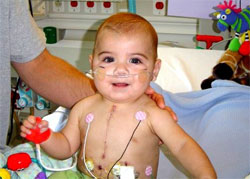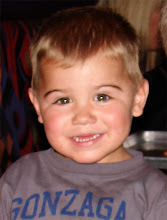 |
| Lots of movies and shows last week! |
With his sats hovering around 72-75% at the peds office Wednesday afternoon, the doc ordered a chest x-ray just to make sure she wasn't missing something. Thankfully, the chest x-ray was clear, so we headed home (with a heart child, you live with the reality that anytime your child is sick, it is a very real possibility you could be admitted to the hospital) with a prescription for Prednisone in hand.
After two days on the steroid and no improvement in the cough, we were discouraged, but still not overly concerned. Until Friday, when Luke woke up crying out in pain in the middle of the night, sobbing because his ear hurt so much. We knew we had to go back to urgent care Saturday morning to get an antibiotic for his ear infection.
 |
| Waiting at urgent care for the results of his RSV test. |
Well.
It wasn't quite that simple, which is so often the case with a heart child. The doc we saw (a good reminder to always see your child's pediatrician if at all possible!) didn't like Luke's elevated white blood cell count and fever cycle. Along with the duration of his cough, he felt very strongly we needed to go to our local ER. My gut was telling me he was overreacting, but at that point, when a doctor is strongly urging you in that direction, what do you do? You go!
Several hours and another chest x-ray later, we were sent home with ear drops and a prescription for Amoxicillin. I'm guessing a $1,500 bottle of Amoxicillin.
As frustrating as the day was, both Roger and I agreed we'd rather doctors err on the side of caution when it comes to our child. We'd rather spend an unnecessary afternoon in the ER than have something go terribly wrong at home.
 |
| Luke earned his Command Ship Chima lego after his hospital visit. |
It's just been one of those weeks where the reality of Luke's heart condition has knocked me down a bit. My Facebook feed is full of CHD Awareness buttons, pictures of beautiful heart babies, and pleas for more funding for this invisible disease. I'm so glad there are so many passionate moms and dads out there working wholeheartedly to raise awareness of this terrible disease. The #1 most common birth defect.
How could congenital heart defects be the most common birth defect? In my experience, most people I tell are shocked by this statistic. I know heart defects were the farthest thing from my mind early in my pregnancy with Luke. I worried about cleft palate and Down Syndrome, but not a heart defect. August 19, 2006 set my husband and I on a path we never expected. A whole world was soon to open up to us; a world of feeding tubes, oxygen saturations, weight gain struggles, cardiac ICU's, echocardiograms, heart failure, medications and EKG's.
I remember meeting with Luke's heart surgeon before he was born at Seattle Children's Hospital. I don't remember everything we discussed but I vividly remember being stunned that my child may actually be blue. I was that unaware of what a heart defect could mean. I can't imagine what Dr. Cohen thought when I repeated, "You mean he might look blue?"
The reason so many people are in the dark about the prevalence of heart defects is that, often, blue-tinged fingertips and toes are the only clue something is wrong with the child. Even though 50% of children born with a heart defect will require an invasive heart surgery at some point in their life, their "zipper" is most often hidden beneath their clothes. A little child's head made bald by cancer is horrifying. A little child's chest sawed open is as horrifying. But CHD research is severely underfunded and talked about even less.
"In the United States, twice as many children die from congenital heart defects each year than from all forms of childhood cancer combined, yet funding for pediatric cancer research is five times higher than funding for CHD." —1in100.orgAny chance I get I share Luke's story in the hopes that awareness brings innovation in the heartland.
I hold so much hope for these heart kiddo's. For goodness sakes, they are — right now — able to create beating heart tissue from your skin cells! But just this week, three heart babies I know of passed away. I think about how far we have to go to find an actual and true cure for congenital heart defects.
I have been asked countless times if Luke's heart will be "fixed" or "good to go" after his next surgery. It will hopefully and prayerfully be stronger, but it won't be cured. His heart will never be a "normal" heart.
As we keep the momentum going from all the awareness raised during Congenital Heart Defect Awareness Week, I wanted to add my list of ways you can help make sure kids like Luke get to live life to the fullest:
1) Donate blood: The American Red Cross website allows you to search by zip code for a blood drive near you.
2) Donate to a reputable CHD organization: All three of the below organizations specifically raise money and awareness for Congenital Heart Defects.
3) Visit Build-a-Bear in the month of February: Build A Bear has created an opportunity for all of their guests to make a contribution to the Congenital Heart Foundation when they complete their purchase during the month of February. This is the fourth year of the partnership, and over $600,000 has been raised to support CHF.
4) Ask about your unborn baby's heart at your 20-week ultrasound: "The only thing worse than having a child with a heart defect is having a child with an undetected heart defect." We are so fortunate our sonographer didn't let us leave our appointment that day (even without being 100% sure something was wrong) without setting up an appointment for us with a pediatric cardiologist. Use this PDF to know what to ask your doctor.
Phew. That was a long update. I have had so many blog posts brewing. Hopefully this one will spark the writing muscle!






